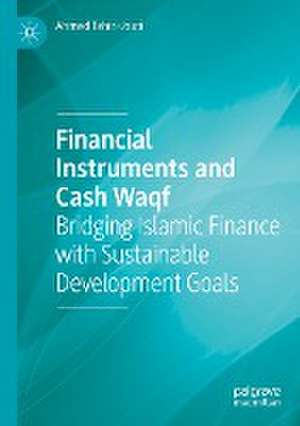Financial Instruments and Cash Waqf: Bridging Islamic Finance with Sustainable Development Goals
Autor Ahmed Tahiri-Joutien Limba Engleză Paperback – 9 mai 2023
| Toate formatele și edițiile | Preț | Express |
|---|---|---|
| Paperback (1) | 871.31 lei 6-8 săpt. | |
| Springer International Publishing – 9 mai 2023 | 871.31 lei 6-8 săpt. | |
| Hardback (1) | 876.44 lei 6-8 săpt. | |
| Springer International Publishing – 8 mai 2022 | 876.44 lei 6-8 săpt. |
Preț: 871.31 lei
Preț vechi: 1062.57 lei
-18% Nou
Puncte Express: 1307
Preț estimativ în valută:
166.80€ • 171.55$ • 138.38£
166.80€ • 171.55$ • 138.38£
Carte tipărită la comandă
Livrare economică 19 februarie-05 martie
Preluare comenzi: 021 569.72.76
Specificații
ISBN-13: 9783031043390
ISBN-10: 3031043391
Ilustrații: XIII, 239 p. 57 illus., 25 illus. in color.
Dimensiuni: 148 x 210 mm
Greutate: 0.31 kg
Ediția:1st ed. 2022
Editura: Springer International Publishing
Colecția Palgrave Macmillan
Locul publicării:Cham, Switzerland
ISBN-10: 3031043391
Ilustrații: XIII, 239 p. 57 illus., 25 illus. in color.
Dimensiuni: 148 x 210 mm
Greutate: 0.31 kg
Ediția:1st ed. 2022
Editura: Springer International Publishing
Colecția Palgrave Macmillan
Locul publicării:Cham, Switzerland
Cuprins
Chapter 1. The Shari'ah economic objectives and Sustainable Development Goals.- Chapter 2. The Islamic social finance : from instruments to institutions.- Chapter 3. SDGs : the intersection between Islamic finance and Islamic social finance.- Chapter 4. Cash Waqf investment accounts meeting SDGs.- Chapter 5. Cash Waqf liquid guarantees meeting SDGs.- Chapter 6. Cash Waqf based Microfinance meeting SDGs.- Chapter 7. Takaful funds meeting Cash Waqf requirements and SDGs.- Chapter 8. Islamic social based crowdfunding meeting SDGs.- Chapter 9. Cash Waqf mutual funds meeting SDGs.- Chapter 10. Cash Waqf sukuk meeting SDGs.- Chapter 11. Cash Waqf venture capital meeting SDGs.- Chapter 12. National Cash Waqf ecosystems.- Chapter 13. Waqf Offshore centers and cross border operations.
Notă biografică
Ahmed Tahiri-Jouti is the Managing Partner and Founder of Green for South, a specialized firm in consulting in sustainable development, impact finance, fintech and building sustainable financial ecosystems. He is the former Managing Partner and CEO at Al Maali Group (Dubai and Casablanca), a consulting firm specialized in Islamic finance. Dr. Ahmed is an associate editor of the ISRA International Journal of Islamic Finance and has published several papers and book chapters in his fields of expertise. He is also a AAOIFI working groups member to issue new governance standards for the Islamic industry. Dr. Ahmed has conceived a training manual entitled 'Islamic Banking Qualification', which has been granted to more than 1500 people in North Africa, West Africa and Europe since its launch. He is also an international speaker and trainer.
Textul de pe ultima copertă
The book, organized in three parts, offers a guide to constructing financial instruments based on cash waqf in alignment with the Sustainable Development Goals. The first part discusses the alignment between the Shari'ah economic objectives and the SDGs, the Islamic social finance concept, its instruments and institutions and the intersection between Islamic finance and Islamic social finance. The second part presents a product structure that is based on cash waqf and is targeting the SDGs specifically. Some of these product structures involve zakat collection. The third part of the book presents the methodology to gather all these product structures in a national cash waqf ecosystem that is targeting SDGs. The aim of this ecosystem is to increase the impact of the various initiatives and instruments. In addition to this, the third part of the book presents the concept of Waqf offshore centers and the methodology to conceive and implement them. The aim of these Waqf offshore centersis to connect national cash waqf ecosystems and individuals with investment opportunities bringing more impact. This book will be of interest to academics, researchers, and practitioners of not only Islamic finance but sustainable finance.
Ahmed Tahiri-Jouti is the Managing Partner and Founder of Green for South, a specialized firm in consulting in sustainable development, impact finance, fintech and building sustainable financial ecosystems. He is the former Managing Partner and CEO at Al Maali Group (Dubai and Casablanca), a consulting firm specialized in Islamic finance. Dr. Ahmed is an associate editor of the ISRA International Journal of Islamic Finance and has published several papers and book chapters in his fields of expertise. He is also a AAOIFI working groups member to issue new governance standards for the Islamic industry. Dr. Ahmed has conceived a training manual entitled 'Islamic Banking Qualification', which has been granted to more than 1500 people in North Africa, West Africa and Europe since its launch. He is also an international speaker and trainer.
Ahmed Tahiri-Jouti is the Managing Partner and Founder of Green for South, a specialized firm in consulting in sustainable development, impact finance, fintech and building sustainable financial ecosystems. He is the former Managing Partner and CEO at Al Maali Group (Dubai and Casablanca), a consulting firm specialized in Islamic finance. Dr. Ahmed is an associate editor of the ISRA International Journal of Islamic Finance and has published several papers and book chapters in his fields of expertise. He is also a AAOIFI working groups member to issue new governance standards for the Islamic industry. Dr. Ahmed has conceived a training manual entitled 'Islamic Banking Qualification', which has been granted to more than 1500 people in North Africa, West Africa and Europe since its launch. He is also an international speaker and trainer.
Caracteristici
Links the Islamic economy to the sustainable development goals Revives the concept of cash waqf Presents new concepts such as offshore waqf centers and national cash waqf ecosystems
